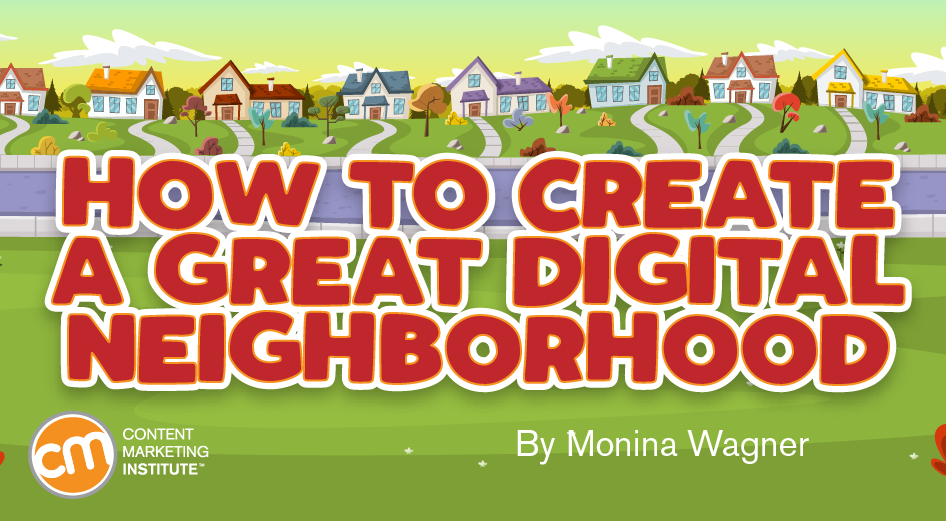Think about the neighborhood you live in. Why do you love it? Why do you hate it?
When my family built a home, we knew our choices would be about much more than cabinets and flooring. We needed to pick the right community for us.
As community manager for the Content Marketing Institute, I’ve learned that the way we design our “neighborhood” plays a huge role in how our audience experiences the brand.
Stay away from cookie-cutter neighborhoods. To start or strengthen a community, you must differentiate your group.
What qualities should good communities have? I’ll discuss those elements and answer the questions I’ve been asked over the years on what your brand should consider for sustained participation. Finally, I’ll share an example of a brand instilling this sense of connectedness.
Create relevant communities
Have you ever surprised your neighbors with their favorite cookies? You’re a good neighbor. You not only engage with your neighbors but you know how to do it in a way they’ll most appreciate. A successful brand community uses the same approach. The brand researches the audience to understand its culture, then operates the community with the audience’s best interests at heart. That approach builds trusting relationships.
Example: Forks Over Knives Facebook Group
Forks Over Knives is a brand that grew from a film to multiple books, apps, and a website about a plant-based way of eating. It created an inclusive Facebook community, which reinforces its mission to support its members’ interest in whole-food, plant-based eating. The brand focuses the community on topics its customers care about and provides members open access to brand experts. It has established itself as a trustworthy online resource with a robust following of over 225,000.

Make them interesting
A good community acts as a social gathering spot. Members want to come back again and again. It is the brand’s job to keep things interesting. A dedicated and educated community manager can be an asset in facilitating conversations the audience craves.
A good community acts as a #social gathering spot, says @MoninaW. #CMWorld Click To TweetExample: Buffer on Slack
Every Monday, the community managers at Buffer announce its group happenings for the week. Some conversations include sharing goals and defining pain points. As the community grows, Buffer invests more resources in staffing, furthering the group’s success.

Provide opportunity to share
Just as good neighbors share a cup of sugar, members of a good community are willing to share. These members become de-facto leaders and influencers, giving their time and knowledge to others. They also anticipate the needs of the group and encourage open communication.
Example: Nokia website-based forum
If a member seeks advice, community members are willing to lend a helping hand and provide common fixes. If the community has an idea for a future product, the brand offers a message board for suggestions. Members feel certain they can solve problems on their own. That confidence helps increase group satisfaction.


Go where your audience is
Choosing a digital home for your community can be difficult. Consider allowing the audience members to pick it. Meeting where they are makes your community appealing because it’s convenient and it doesn’t require a new learning curve to participate.
Example: CMI on Slack
As the CMI community grew, the needs of our members evolved. In one-on-one interviews, audience members indicated they wanted more activity on Slack. In the upcoming weeks, our Slack activity will expand. We’ll continue to promote CMI activity on Slack via email and social media. If you’re interested in an invite, let me know.

Be respectful
A community is a shared space. Good neighbors show respect and courtesy and so should online community group members. Set rules that allow your community to work toward a common goal. Post the rules to make it easier to manage the group and moderate conversations.
Example: Step into the Spotlight! on LinkedIn
Group rules in the Step into the Spotlight! LinkedIn Group set standards for how the community is run. They include no sales pitches and no self-promotion. Members expect relevant discussions that showcase the community’s expertise. Setting these expectations (and enforcing them) allows for the group to have a thriving community.

Foster friendliness
If your group is valuable and fun, members will naturally want to further their relationships. Identify how to make those connections. Don’t forget, even in this connected age, in-person events can be a great way for members to get to know each other more deeply.
Example: Content Marketing World meetup
At Content Marketing World 2014, the CMI team held a #CMWorld Twitter Chat meetup in the expo hall. It brought together the people who had tweeted with each other for the past 12 months. But it wasn’t enough. Like a good neighbor would, some community members stepped up and asked to coordinate a larger effort. The meetup has grown since that 2014 debut.

Non-CMWorld attendees now have FOMO, but CMI offers opportunities for those who can’t attend to engage further with the brand in other ways. For instance, you may be able to contribute to a CMI crowdsourced article, write for the CMI audience, or have your user-generated content featured on CMI social media channels.
Don’t forget the cookies
And just as good neighbors thank the person next door with their favorite cookies, brand communities can cook up some surprises too. CMI has been known to give a digital shout-out for birthdays, promotions, etc., and even a snail mail surprise or two to our community members.
Even if you don’t have a cookie budget, you have the tools to build your brand in a neighborhood where your audience members are, in a way that will entice and engage them, in a format that breeds respect and trust. And that’s the recipe for community success.
Cover image by Joseph Kalinowski/Content Marketing Institute

